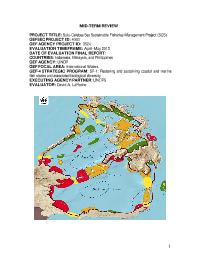
Midterm Evaluation Sulu Celebes Seas Sustainable Fisheries Management
Completedon 24 May, 2013
Evaluation Plan
Planned End Date
May 2013
Evaluation Type
Project
Management Response
Yes
Evaluation Budget
$15,000
Evaluation Title
Midterm Evaluation Sulu Celebes Seas Sustainable Fisheries Management
Atlas Project Number
00058166
Plan Period
Status
Completed
Type
Project
Plan Date
1 May, 2013
Completion Date
24 May, 2013
Budget
$15,000
Expenditure
$0
Source of Funding
Project Funds
Management Response
Yes
Quality Assessment
No
Joint Programme
No
Joint Evaluation
No
GEF Evaluation
Yes
Expand
Stakeholders
DA-BFRA, LGUs, NGOs
Countries
Philippines
Atlas Project Number
00058166
Plan Period
Status
Completed
Type
Project
Management Response
Yes
Plan Date
1 May, 2013
Quality Assessment
No
Completion Date
24 May, 2013
Joint Programme
No
Joint Evaluation
No
Budget
$15,000
GEF Evaluation
Yes
Expand
Expenditure
$0
Stakeholders
DA-BFRA, LGUs, NGOs
Source of Funding
Project Funds
Countries
Philippines
Output 2.5. Legal and regulatory frameworks, policies and institutions enabled to ensure the conservation, sustainable use, and access and benefit sharing of natural resources, biodiversity and ecosystems, in line with international conventions and national
1: Others


